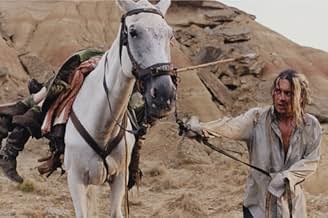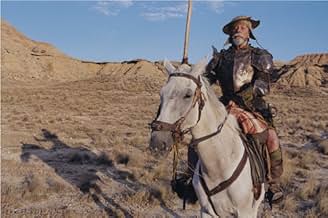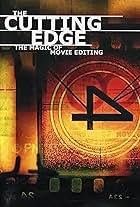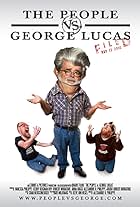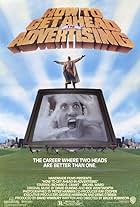Terry Gilliam's doomed attempt to get his film, The Man Who Killed Don Quixote (2018), off the ground.Terry Gilliam's doomed attempt to get his film, The Man Who Killed Don Quixote (2018), off the ground.Terry Gilliam's doomed attempt to get his film, The Man Who Killed Don Quixote (2018), off the ground.
- Directors
- Writers
- Stars
- Nominated for 1 BAFTA Award
- 2 wins & 11 nominations total
Jeff Bridges
- Narrator
- (voice)
Philip A. Patterson
- Self - First Assistant Director
- (as Phil Patterson)
Benjamín Fernández
- Self - Production Designer
- (as Benjamin Fernandez)
Vanessa Paradis
- Self
- (archive footage)
Orson Welles
- Self
- (archive footage)
- Directors
- Writers
- All cast & crew
- Production, box office & more at IMDbPro
Featured reviews
Thanks to DVD, we've all become accustomed to seeing `inside' documentaries about the making of some of our favorite films. But what of those films that for whatever reason never end up seeing the light of day? Are there any lessons to be learned from examining the making (or near making) of those works? This is the questioned posed by `Lost in La Mancha,' a behind-the-scenes chronicle of director Terry Gilliam's attempt to fulfill his decade-long dream of bringing Cervantes' `Don Quixote' to the big screen, a project that ended up in heartbreaking, catastrophic failure for both the filmmaker and the gifted crew with which he was working.
Directors Keith Fulton and Louis Pepe did not, of course, set out to record such a debacle. Like all the people involved in the making of `The Man Who Killed Don Quixote' a film intended to star Jean Rochefort and Johnny Depp - the documentary filmmakers assumed that Gilliam and his crew would end up with an impressive finished product and that their own work would serve as little more than supplemental material on a future DVD release of the film, certainly not a theatrical release in its own right. What none of them foresaw was the series of almost Biblical disasters that would ultimately doom the film to a state of perpetual nonexistence. Flash floods, health problems, nervous investors and bottom line insurance agents all eventually conspired to prevent Gilliam's dream from becoming a reality. Thus, what became a bust for Terry Gilliam turned into a boon for Fulton and Pepe.
With the benefit of hindsight, the filmmakers ensure that the parallels between Don Quixote and Gilliam himself are never far from the viewer's mind. Gilliam, a maverick director whose movies have always tested the boundaries of the film medium, is clearly an artist and a visionary obsessed with impossible dreams of his own, but dreams that inspire those around him to strive for a greatness not always nurtured by the mundane realities of the everyday world. The fact that, in this particular case, those realities intervened to bring his vision crashing back to earth only completes the connection to the Quixote figure. Gilliam spends most of his time in this film tilting at his own windmills, only to find that the vagaries of fate are more terrifying than any giants Quixote might have imagined. The documentary also notes that Gilliam is not the only major director to have been stymied in his attempt to adapt this material; the great Orson Welles failed to complete his version of `Don Quixote' as well. The irony of these two innovative cinema giants both failing with THIS particular material pervades the film with an eerie sense of doom and foreboding.
`Lost in La Mancha' is an instructive film on a technical level, but also immensely sad on an emotional one. Because we know from the beginning that this venture is doomed to failure, even the moments of hope and optimism early on in the film carry with them an air of fatalistic melancholy. This pre-knowledge also turns the many admittedly humorous moments into genuine black comedy.
It is always painful to see genius and creativity choked off at the root, especially since the few glimpses we get of actual completed footage hint at what a fine production this `Don Quixote' might have been. As to Gilliam, one can only hope that he will continue to pursue his impossible dream despite all the roadblocks reality has set in his way. Don Quixote would have wanted it that way.
Directors Keith Fulton and Louis Pepe did not, of course, set out to record such a debacle. Like all the people involved in the making of `The Man Who Killed Don Quixote' a film intended to star Jean Rochefort and Johnny Depp - the documentary filmmakers assumed that Gilliam and his crew would end up with an impressive finished product and that their own work would serve as little more than supplemental material on a future DVD release of the film, certainly not a theatrical release in its own right. What none of them foresaw was the series of almost Biblical disasters that would ultimately doom the film to a state of perpetual nonexistence. Flash floods, health problems, nervous investors and bottom line insurance agents all eventually conspired to prevent Gilliam's dream from becoming a reality. Thus, what became a bust for Terry Gilliam turned into a boon for Fulton and Pepe.
With the benefit of hindsight, the filmmakers ensure that the parallels between Don Quixote and Gilliam himself are never far from the viewer's mind. Gilliam, a maverick director whose movies have always tested the boundaries of the film medium, is clearly an artist and a visionary obsessed with impossible dreams of his own, but dreams that inspire those around him to strive for a greatness not always nurtured by the mundane realities of the everyday world. The fact that, in this particular case, those realities intervened to bring his vision crashing back to earth only completes the connection to the Quixote figure. Gilliam spends most of his time in this film tilting at his own windmills, only to find that the vagaries of fate are more terrifying than any giants Quixote might have imagined. The documentary also notes that Gilliam is not the only major director to have been stymied in his attempt to adapt this material; the great Orson Welles failed to complete his version of `Don Quixote' as well. The irony of these two innovative cinema giants both failing with THIS particular material pervades the film with an eerie sense of doom and foreboding.
`Lost in La Mancha' is an instructive film on a technical level, but also immensely sad on an emotional one. Because we know from the beginning that this venture is doomed to failure, even the moments of hope and optimism early on in the film carry with them an air of fatalistic melancholy. This pre-knowledge also turns the many admittedly humorous moments into genuine black comedy.
It is always painful to see genius and creativity choked off at the root, especially since the few glimpses we get of actual completed footage hint at what a fine production this `Don Quixote' might have been. As to Gilliam, one can only hope that he will continue to pursue his impossible dream despite all the roadblocks reality has set in his way. Don Quixote would have wanted it that way.
"The Man Who Killed Don Quixote" has the makings of a brilliant film. It's a twisted take on Cervantes from the mind of director Terry Gilliam, starring Jean Rochefort, Johnny Depp, and Vanessa Paradis. The only problem is that the film has not been made. It REFUSES to be made.
Filmmakers Keith Fulton and Louis Pepe initially set out to chronicle Gilliam as he made his quixotic dream come true. Instead they captured the floods, bombings, and various "acts of God" that shut the movie down. The result is "Lost in La Mancha", a documentary about a courageous but capsizing production. It works because by presenting Gilliam's story, Fulton and Pepe also illustrate the joy and pain that all filmmakers experience to some degree. We often witness Gilliam's frustration, but we also see his delight when his vision briefly comes to life.
One is left with a new appreciation for the daring movies that do make it through production, as well as some hope for the completion of "The Man Who Killed Don Quixote". Gilliam is depicted as a dreamer, not a failure. "Lost in La Mancha" is an enjoyable celebration of those who tilt at windmills.
Filmmakers Keith Fulton and Louis Pepe initially set out to chronicle Gilliam as he made his quixotic dream come true. Instead they captured the floods, bombings, and various "acts of God" that shut the movie down. The result is "Lost in La Mancha", a documentary about a courageous but capsizing production. It works because by presenting Gilliam's story, Fulton and Pepe also illustrate the joy and pain that all filmmakers experience to some degree. We often witness Gilliam's frustration, but we also see his delight when his vision briefly comes to life.
One is left with a new appreciation for the daring movies that do make it through production, as well as some hope for the completion of "The Man Who Killed Don Quixote". Gilliam is depicted as a dreamer, not a failure. "Lost in La Mancha" is an enjoyable celebration of those who tilt at windmills.
Filmmaker & Monty Python alumni Terry Gilliam has dreamed for years of making a movie about Don Quixote. He finally got the chance to make his dream movie, "The Man Who Killed Don Quixote," in 2000, starring Johnny Depp and, in the title role of Don Quixote, French actor Jean Rochefort. But due to budget problems, shooting schedule problems, horrible weather problems, and the unfortunate ill health of actor Rochefort, the production was a disaster from the word go. After only 6 days of troubled shooting, "The Man Who Killed Don Quixote" was completely abandoned.
Fortunately, out of the wreckage of Terry Gilliam's never-finished film comes "Lost In La Mancha," a brilliant documentary that captures everything that went wrong with the movie, from the first eight weeks of pre-production (which wasn't smooth sailing either) to the disastrous six-day shoot that followed. We see both sides to Gilliam throughout the movie---one minute he's giddy with delight at making his dream movie, the next minute he's blowing his obscenity-laden top over his project collapsing all around him. And it's not just Gilliam who suffers, as *everyone* involved with the movie, both in front of & behind the camera, gets dragged down right along with him as all hell breaks loose on the doomed production.
Watching "Lost In La Mancha" is not only fascinating, but it's also very educational, giving the viewer a first-hand look at what goes on behind the scenes of mounting a movie, including all of the business aspects involved such as financing & other professional agreements that have to be made before a single frame is shot. It's also a sad documentary to watch, too. Looking at all the terrific hardware, costumes and set pieces that were created for the movie (including marvelous life-size marionette puppets that can march in perfect synchronicity), plus the widescreen footage of the scant few scenes Gilliam shot before the production was shut down, the viewer is given a genuine glimpse of the movie that *might* have been, and is all the more saddened---and sympathetic with Gilliam & his team---because of it.
Happily, though, all is not lost for "The Man Who Killed Don Quixote" just yet. Terry Gilliam is reportedly preparing for a second attempt at shooting the movie, and, having seen the movie's potential in this excellent documentary, I wish Gilliam all the best in the world in finally bringing his Don Quixote movie to the big screen. Judging by the glimpses of it in "Lost In La Mancha," I definitely believe it will be a truly great movie. :-)
Fortunately, out of the wreckage of Terry Gilliam's never-finished film comes "Lost In La Mancha," a brilliant documentary that captures everything that went wrong with the movie, from the first eight weeks of pre-production (which wasn't smooth sailing either) to the disastrous six-day shoot that followed. We see both sides to Gilliam throughout the movie---one minute he's giddy with delight at making his dream movie, the next minute he's blowing his obscenity-laden top over his project collapsing all around him. And it's not just Gilliam who suffers, as *everyone* involved with the movie, both in front of & behind the camera, gets dragged down right along with him as all hell breaks loose on the doomed production.
Watching "Lost In La Mancha" is not only fascinating, but it's also very educational, giving the viewer a first-hand look at what goes on behind the scenes of mounting a movie, including all of the business aspects involved such as financing & other professional agreements that have to be made before a single frame is shot. It's also a sad documentary to watch, too. Looking at all the terrific hardware, costumes and set pieces that were created for the movie (including marvelous life-size marionette puppets that can march in perfect synchronicity), plus the widescreen footage of the scant few scenes Gilliam shot before the production was shut down, the viewer is given a genuine glimpse of the movie that *might* have been, and is all the more saddened---and sympathetic with Gilliam & his team---because of it.
Happily, though, all is not lost for "The Man Who Killed Don Quixote" just yet. Terry Gilliam is reportedly preparing for a second attempt at shooting the movie, and, having seen the movie's potential in this excellent documentary, I wish Gilliam all the best in the world in finally bringing his Don Quixote movie to the big screen. Judging by the glimpses of it in "Lost In La Mancha," I definitely believe it will be a truly great movie. :-)
Terry Gilliam's had a controversial career. His "Brazil" in 1985 upset Universal because it had a "sad" ending, so they cut it apart and replaced the finale with a "happier" version. Gilliam hated their hack job of his work, and illegally screened his original version for a critics' circle -- they voted it one of the best films of the year. Soon Gilliam got his way and the film was released as he had originally intended, and it's now considered a classic.
A few years later he released "The Adventures of Baron Manchusen," a fantasy flop that went some $20 million over budget and collapsed at the box office. He quit directing for a while and, when he returned, started work on "Twelve Monkeys." It wasn't the best of shoots and his perfectionism resulted in eccentric, intolerable shooting schedules.
In 1998 "Fear and Loathing in Las Vegas" was released and the MPAA hated it, threatening to give it an X rating for its drug content. Released alongside "Godzilla," it flopped, but to this day remains a cult classic.
So it's reasonable to say Gilliam is quite an eccentric personality and has had a tumultuous career.
"The Man Who Killed Don Quixote" was going to be his new film until it crashed. The production was halted because Gilliam couldn't find an actor to play Quixote, flash floods destroyed equipment and one of his shooting locations was in fact a NATO airfield which created quite a problem for the filmmakers.
Gilliam's film probably would have been a great twist on the classic tale and I'm sure his eccentric vision would have suited it well. He also had a cameo by Johnny Depp in the movie and it's quite funny as shown in this documentary detailing the events of the production.
Gilliam recently said he's going to start production on this again and finish it up. I hope so, it really does look like a promising film.
In terms of this documentary itself, it's very insightful and a must-see for any Gilliam fan or aspiring director -- it's entertaining and important, and a great guide on how NOT to make a movie.
A few years later he released "The Adventures of Baron Manchusen," a fantasy flop that went some $20 million over budget and collapsed at the box office. He quit directing for a while and, when he returned, started work on "Twelve Monkeys." It wasn't the best of shoots and his perfectionism resulted in eccentric, intolerable shooting schedules.
In 1998 "Fear and Loathing in Las Vegas" was released and the MPAA hated it, threatening to give it an X rating for its drug content. Released alongside "Godzilla," it flopped, but to this day remains a cult classic.
So it's reasonable to say Gilliam is quite an eccentric personality and has had a tumultuous career.
"The Man Who Killed Don Quixote" was going to be his new film until it crashed. The production was halted because Gilliam couldn't find an actor to play Quixote, flash floods destroyed equipment and one of his shooting locations was in fact a NATO airfield which created quite a problem for the filmmakers.
Gilliam's film probably would have been a great twist on the classic tale and I'm sure his eccentric vision would have suited it well. He also had a cameo by Johnny Depp in the movie and it's quite funny as shown in this documentary detailing the events of the production.
Gilliam recently said he's going to start production on this again and finish it up. I hope so, it really does look like a promising film.
In terms of this documentary itself, it's very insightful and a must-see for any Gilliam fan or aspiring director -- it's entertaining and important, and a great guide on how NOT to make a movie.
Anything that can go wrong, will go wrong
But to start at the beginning. There was finally something in the cinemas from the background of movie-making, about how the movies are made and what are the costs. They were high in this case
It was really fascinating to see the project falling apart so quickly. I think it would have been a wonderful movie if made, proof of this are all former Gilliam's works. But I also think that there could have been more about the movie itself (not just the catastrophes) like storyboards, and definitely more about the plot. Because at least I would rather hear Gilliam talking about the plot than hear him saying f*** for the umpteenth time. I just think that little bit more details would have been fine. But maybe Gilliam didn't say more on purpose, maybe he still wants to make the movie so he keeps it secret yet. We'll see. But if he ever does make it, I'll make sure not to miss it.
Storyline
Did you know
- TriviaFulton and Pepe intended to make a television documentary about the development and pre-production of Terry Gilliam's long-awaited passion project. They had no idea that the story would develop into its own quixotic tragedy. After the project failed, Fulton and Pepe were wary of finishing their film until Gilliam said "someone has to get a film out of this. I guess it's going to be you."
- Quotes
Terry Gilliam: I want to know when we're fucked in advance, not in the middle of a shoot.
- Crazy creditsAt the end of the credits we see the footage of the giants running menacingly towards the screen (which Gilliam admitted would make a great trailer). Just before it fades to black, the words "COMING SOON" are emblazoned across the screen. At the fadeout, we hear Gilliam's distinctive laugh.
- Alternate versionsAlthough the U.S. home video version has a listed running time of 93 minutes, the version on the tape runs only 89 minutes.
- ConnectionsFeatured in Zomergasten: Episode #18.2 (2005)
- How long is Lost in La Mancha?Powered by Alexa
Details
- Release date
- Countries of origin
- Languages
- Also known as
- 救命吶!唐吉訶德
- Filming locations
- Bardenas Reales, Navarra, Spain(shooting in the desert)
- Production companies
- See more company credits at IMDbPro
Box office
- Gross US & Canada
- $732,393
- Opening weekend US & Canada
- $63,303
- Feb 2, 2003
- Gross worldwide
- $1,407,019
Contribute to this page
Suggest an edit or add missing content



